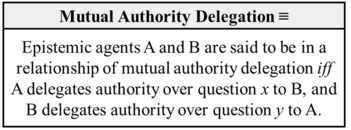Mutual Authority Delegation (Patton-2019)
This is a definition of Mutual Authority Delegation that states "Epistemic agents A and B are said to be in a relationship of mutual authority delegation iff A delegates authority over question x to B, and B delegates authority over question y to A."
This definition of Mutual Authority Delegation was formulated by Paul Patton in 2019.1 It is currently accepted by Scientonomy community as the best available definition of the term.
Contents
Scientonomic History
Acceptance Record
| Community | Accepted From | Acceptance Indicators | Still Accepted | Accepted Until | Rejection Indicators |
|---|---|---|---|---|---|
| Scientonomy | 6 February 2023 | The definition became accepted as a result of the acceptance of the respective modification. | Yes |
Suggestions To Accept
Here are all the modifications where the acceptance of this definition has been suggested:
| Modification | Community | Date Suggested | Summary | Verdict | Verdict Rationale | Date Assessed |
|---|---|---|---|---|---|---|
| Sciento-2019-0017 | Scientonomy | 26 December 2019 | Accept the definitions of authority delegation, and its subtypes, that generalize the currently accepted definitions to apply to all epistemic agents, rather than only communities. | Accepted | The commentators found the modification uncontroversial.c1 c2 It was noted that the modification "merely attempts to capture what is already de facto accepted - namely, the idea that authority can be delegated by and to epistemic agents of all kinds (both communal and individual)" as indicated by the "fact that the canonical examples of authority delegation often involve individual experts (see, for example, Loiselle 2017)".c3 It was agreed that the modification "introduces a necessary rewording in the definitions of authority delegation and its species".c4 | 6 February 2023 |
Question Answered
Mutual Authority Delegation (Patton-2019) is an attempt to answer the following question: What is mutual authority delegation? How should it be defined?
See Mutual Authority Delegation for more details.
Description
The definition tweaks the original definition of the term by Overgaard and Loiselle to ensure that the relationship of multiple authority delegation can obtain between epistemic agents of all types. It also substitutes question for topic, as the former is the proper scientonomic term that should be used.
Overgaard and Loiselle illustrate the relationship of mutual authority delegation by a number of examples. For one, physicists acknowledge that biologists are the experts on questions concerning life, and likewise biologists acknowledge that physicists are the experts on questions concerning physical processes. Similar relationships can be found within individual scientific disciplines. Consider, for instance, the relationship between theoretical and applied physicists, where despite the differences in their methods and overall objectives, the two communities customarily delegate authority to each other on a wide array of topics.
Reasons
No reasons are indicated for this definition.
If a reason supporting this definition is missing, please add it here.
Questions About This Definition
There are no higher-order questions concerning this definition.
If a question about this definition is missing, please add it here.
References
- ^ Patton, Paul. (2019) Epistemic Tools and Epistemic Agents in Scientonomy. Scientonomy 3, 63-89. Retrieved from https://scientojournal.com/index.php/scientonomy/article/view/33621.
